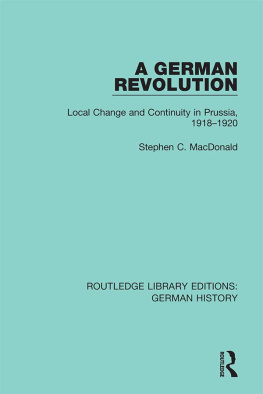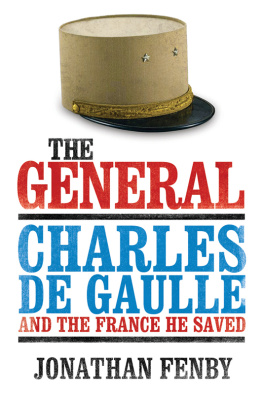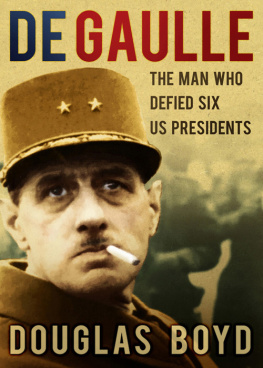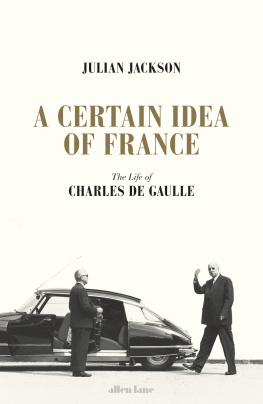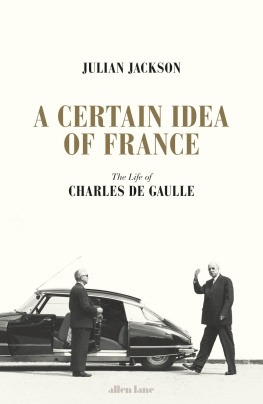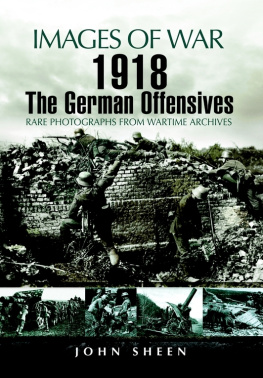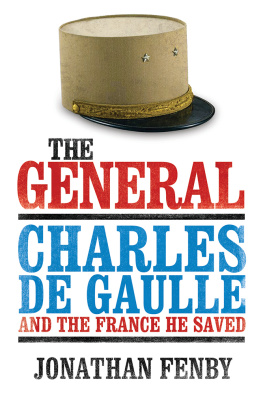2002 The University of North Carolina Press
All rights reserved
Manufactured in the United States of America
Set in Charter and Bell Gothic
by Tseng Information Systems, Inc.
The paper in this book meets the guidelines for permanence and durability of the Committee on Production Guidelines for Book Longevity of the Council on Library Resources.
Ouvrage publi avec laide du Ministre franais
charg de la cultureCentre national du livre.
This work has been published with the assistance of
the French Ministry of Cultures National Book Center.
Library of Congress Cataloging-in-Publication Data
Gaulle, Charles de, 18901970.
[Discorde chez lennemi. English]
The enemys house divided / by Charles de Gaulle; translated,
annotated, and with an introduction by Robert Eden.
p. cm.
Includes bibliographical references and index.
ISBN 0-8078-2666-9 (cloth: alk. paper)
1. Germany. HeerHistoryWorld War, 19141918. 2. World
War, 19141918Germany. 3. GermanyPolitics and
government18711918. 4. Military art and science
GermanyHistory20th century. 5. StrategyHistory
20th century. I. Eden, Robert. II. Title.
D531 .G3313 2002
940.541343dc21 2002005326
cloth 06 05 04 03 02 5 4 3 2 1
Acknowledgments
This translation has been a long conversation with de Gaulle, in which exceptional friends and colleagues have generously taken part. At the beginning, I would not have dared to hope for such a distinguished translating team. Doing justice to what each has contributed may not be possible, because the threads have become so thoroughly interwoven, over many revisions. My first purpose here is to give them the prominent place they deserve in this book. It is a tribute to de Gaulles thought, that individuals of such quality were willing to give their best to make it available in English, with only the readers gratitude and mine for reward.
Frederic Fransen completed his doctoral work at the University of Chicagos Committee on Social Thought in 1996, under the French historian Franois Furet. His principal field is nineteenth- and twentieth-century European political thought; his first book is The Supranational Politics of Jean Monnet (Westport, Conn.: Greenwood, 2001). Now a senior fellow at Liberty Fund, Inc., he is currently writing a comparative history of nineteenth-century European liberalism. His thorough critique of the translation saved it from numerous errors, and his judicious comments, particularly on ongoing controversies in World War I historiography, guided my judgment about points the annotations should clarify and issues the Introduction should address.
Some of the most intransigent difficulties were presented by technical terms. Insofar as the English of this translation conveys de Gaulles military French correctly, it is due to Major David Lasalle, military attach at the United States Embassy in Paris. In the course of his careful reading, he also came up with felicitous renderings for several of de Gaulles subtler remarks on military-civilian relations and diplomacy. My friend Ken Masugi, Lasalles colleague at the Air Force Academy, did me a great favor in seeking him out for the task.
De Gaulles style in this work is for the most part direct and matter-of-fact. However, even in this less rhetorical, early book, the translator should be alert to de Gaulles extraordinary ear for words that echo with older connotations. I was very fortunate to have two friends who were able to help me with this challenge, as well as with more common problems of translation. One was Herbert J. Izzo, professor emeritus of the University of Calgary, who received B.A., B.S., M.A., and Ph.D. degrees from the University of Michigan in historical linguistics and comparative Romance linguistics. He did additional studies in Mexico, New Mexico, and Italy, and has taught at the University of Arizona, San Jose State University, Stanford University, and the University of Michigan. The other was Olga F. Koutna-Izzo, who received her B.A. in French and Latin in Czechoslovakia, where she taught for several years. After moving to Canada, she earned her M.A. in linguistics and a Ph.D. in French and Romance linguistics at the University of Calgary. She has taught at the University of Calgary and Hillsdale College and is now on the faculty of Ave Maria College in Ypsilanti, Michigan.
A good colleague, Dr. Jerry Fallon, wisely urged me to show my first draft to a Hillsdale neighbor from France; this proved to be invaluable advice. Solange Roberts was raised in the Suez Canal Zone; her father directed the Canal Authority until the war over Suez in 1956, when the family returned to France. She has been associated with Hillsdale College since 1976. Her love of her native language and of good English have been a constant inspiration to me. She studied my draft in painstaking detail, comparing La Discorde chez lennemi line by line. She also brought it to the attention of her sister, Madame Patricia Percival, Minister for French Veterans of Foreign Wars Living Abroad, and a member of the Fondation de Gaulle, whose warm encouragement and timely support did much to advance the project. Madame Percival was decorated for the Legion of Honor, in Paris, on June 14, 2001. Together, these two cultivated Frenchwomen have been guardian angels to this edition. It owes a great deal to their lively admiration of de Gaulle, and I hope it meets their high standards.
Alexander Shtromas graduated from Moscow University Law School and was a prominent legal scholar in several Soviet research institutes before placing his expertise at the service of Andrei Sakharovs dissidence. Expelled from the Soviet Union in 1972, he taught at the University of Salford in Great Britain, the University of Chicago, Boston College, and Assumption College before joining the Department of History and Political Science at Hillsdale College in 1989. Famous throughout Eastern Europe as an indefatigable enemy of tyranny and a scholar of prodigious learning, Alex was also an amazing linguist. In 1997, he took time from more urgent and timely projects of his own to help me translate de Gaulles French more precisely. Alex Shtromas died of cancer in 1998, leaving a place no one can fill.
I owe a special debt of gratitude to Daniel J. Mahoney, whose excellent work on de Gaulle persuaded me that I should study the Mmoires de guerre in depth, and thus launched the inquiry that led to this translation. I have drawn strength from his friendship throughout the project. It would not have been nearly so fruitful or so instructive without Dans steady reinforcement: his common sense, his exemplary appropriation of the moral and political traditions of the West, his staunch defense of the most serious citizens of our time, and his constant attention to France.
In revising the Introduction, I benefited from the astute criticism of my Hillsdale colleagues Will Morrisey, Mickey Craig, and Marie-Claire Morellec; and my debt to Morriseys books on de Gaulle and Malraux are also reflected in it. Robert K. Faulkners thorough, exacting reading led to many stylistic improvements and to a general tightening; his enthusiasm for de Gaulles book also refreshed me at a crucial time in writing the Introduction. Paul Rahes suggestions on an early draft prompted major improvements. So did the valuable suggestions of Samuel Williamson. My wife Anne read draft after draft with great patience, and her powerful response to its story assured me, amidst a sea of troubles, that I was on the right course.


